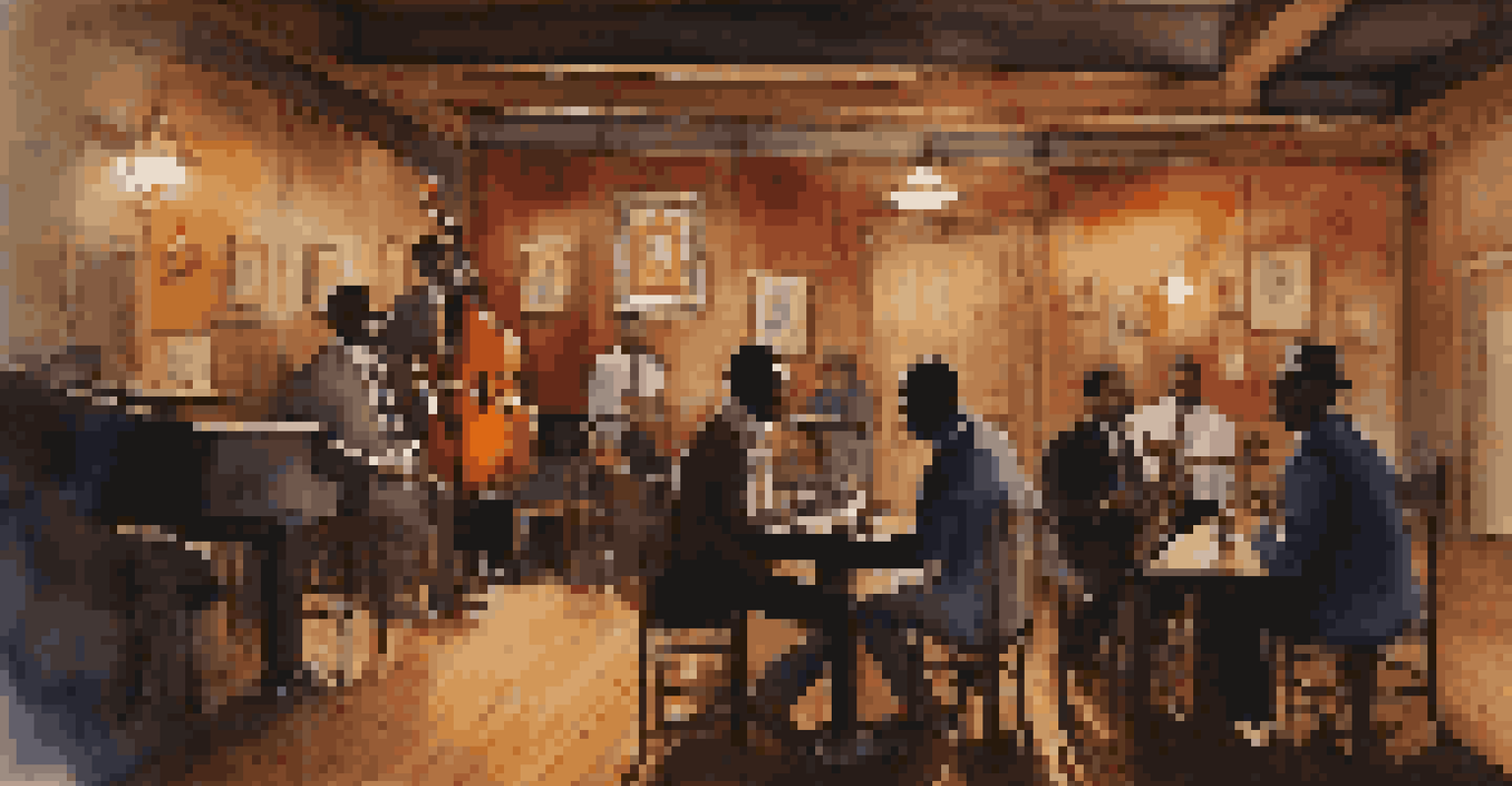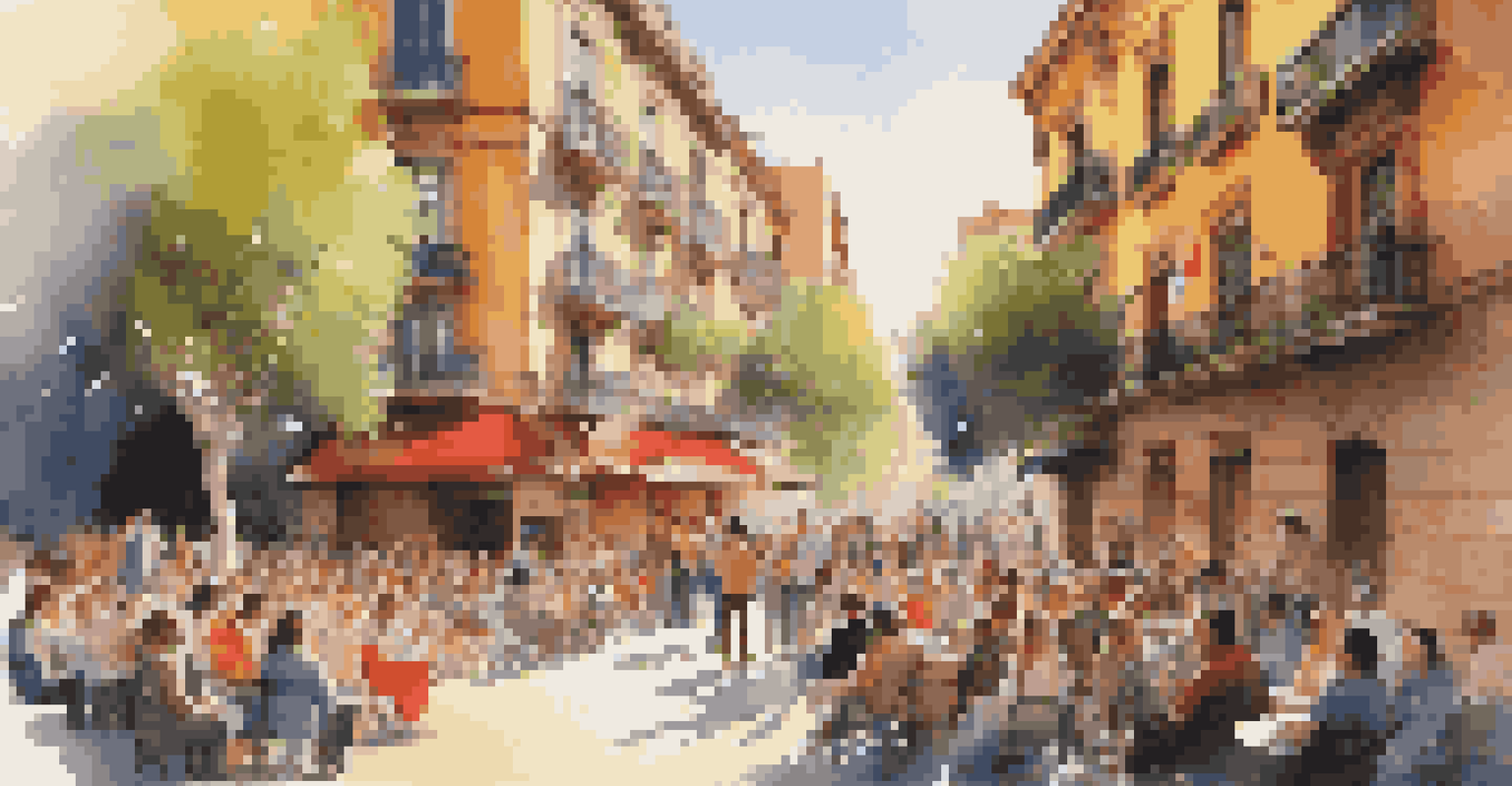Music and Tourism: A Bridge for Cultural Exchange

The Role of Music in Cultural Identity
Music is often a reflection of cultural identity, acting as a soundtrack to the traditions and values of a community. When tourists visit a new place, they encounter not just the sights but the sounds that define that culture. For instance, listening to traditional Flamenco in Spain can evoke the passion and heritage of the region, creating a deeper understanding for visitors.
Music can change the world because it can change people.
This connection can enhance the travel experience, making it more meaningful and memorable. Tourists who engage with local music are not just passive observers; they become part of the cultural narrative. This interaction fosters a sense of belonging and appreciation for the destination's history and customs.
Moreover, music can serve as a bridge between different cultures, allowing people to find common ground through shared rhythms and melodies. It opens doors to conversations and connections that might not happen through language alone, enriching the overall experience of travel.
Music Festivals: A Global Gathering
Music festivals have become a prominent aspect of tourism, drawing visitors from around the world to celebrate diverse sounds. Events like Coachella in the United States or Glastonbury in the UK attract massive crowds, showcasing not only music but also local culture and art. This convergence of people creates a vibrant atmosphere where cultural exchange thrives.

These festivals often highlight local artists, giving them a platform to share their music with a global audience. For tourists, this is a unique opportunity to discover new genres and witness performances that might not be available elsewhere. It's not just about enjoying music; it's about experiencing the heartbeat of a community.
Music Enhances Cultural Identity
Engaging with local music allows tourists to connect deeply with a destination's traditions and values.
Additionally, music festivals encourage local economies by attracting tourism and providing employment opportunities. As visitors flock to these events, they also explore the surrounding areas, dine at local restaurants, and shop at nearby stores, benefiting the entire community.
Local Music Scenes: Hidden Gems for Tourists
Beyond the big festivals, many cities boast vibrant local music scenes that offer tourists a more intimate experience. Venues like jazz clubs in New Orleans or street performances in Barcelona allow travelers to immerse themselves in the local culture. These settings often feel more authentic, offering a glimpse into the everyday life of residents.
Without music, life would be a mistake.
Exploring these local music scenes can lead to unexpected discoveries and connections. Tourists may find themselves chatting with local musicians or fellow attendees, fostering a sense of community and shared passion. It's these moments that often leave lasting memories and deepen a traveler's appreciation for a destination.
Furthermore, engaging with local music can inspire tourists to learn more about the culture, encouraging them to explore history, art, and traditions that define the area. This holistic approach to travel enriches the experience, turning a simple trip into a journey of discovery.
Music as a Tool for Cultural Preservation
Music plays a crucial role in preserving cultural heritage, especially in communities at risk of losing their traditions. Initiatives that promote local music not only celebrate the art form but also ensure that future generations remain connected to their roots. By attracting tourists to these musical traditions, communities can safeguard their cultural identity.
For example, indigenous music often carries stories and history that are vital to understanding a culture. When tourists engage with these art forms, they help to validate and support the artists and traditions that keep such stories alive. This interaction fosters respect and appreciation for the culture, promoting sustainability.
Music Festivals Boost Tourism
Events like Coachella and Glastonbury create vibrant cultural exchanges and support local economies.
Moreover, many communities have started to create programs that combine tourism with cultural education, using music as a teaching tool. Through workshops or performances, visitors can learn about the significance of the music while contributing to its preservation. This creates a cycle of appreciation and support, benefiting both tourists and locals.
How Music Influences Travel Decisions
Music has a powerful impact on travel decisions, often influencing where people choose to go. Soundtracks in movies, music videos, or even popular songs can spark interest in a destination, as viewers associate the music with the location. For example, many travelers flock to Hawaii after hearing a catchy ukulele tune that evokes images of beaches and sunsets.
Additionally, music can set the mood for potential travelers when they are researching destinations. Playlists that highlight local sounds can create an emotional connection, making a place feel more inviting. This emotional appeal is a key factor in attracting tourists who want to experience the music they've heard in a different context.
Travel companies have recognized this trend, often incorporating music into their marketing strategies. From curated playlists to collaborations with artists, they create an immersive experience that resonates with potential travelers. This innovative approach not only promotes destinations but also highlights the unique musical culture they offer.
The Impact of Technology on Music Tourism
In our digital age, technology has transformed how we experience and discover music while traveling. Streaming services like Spotify or Apple Music allow travelers to access local playlists, giving them a taste of the culture before they even arrive. This accessibility helps tourists plan their music-centric itineraries with ease.
Furthermore, social media platforms have become vital tools for promoting music tourism. Artists share their performances, and venues showcase upcoming events, creating buzz that attracts visitors. Travelers often rely on platforms like Instagram to discover hidden gems, leading them to local artists and music scenes.
Technology Shapes Music Discovery
Streaming services and social media enable travelers to discover local music, enhancing their travel experiences.
However, technology also poses challenges, as the saturation of music online can make it difficult for smaller, local artists to stand out. It's crucial for tourists to seek out authentic experiences and support local talents, ensuring that the music they encounter is a genuine representation of the culture.
Conclusion: Celebrating Music as Cultural Exchange
As we've explored, music is much more than just entertainment; it serves as a powerful vehicle for cultural exchange. Whether through festivals, local scenes, or digital platforms, music connects travelers and communities in meaningful ways. This connection enriches the travel experience, fostering appreciation and understanding between diverse cultures.
Tourism that embraces music encourages travelers to engage with local customs and traditions, creating a two-way street of cultural sharing. In turn, this exchange not only benefits tourists but also supports local economies and preserves cultural heritage.

Ultimately, by celebrating music as a bridge for cultural exchange, we can create a world where understanding and appreciation flourish. So, the next time you travel, let the local sounds guide your journey and deepen your connection to the places you visit.